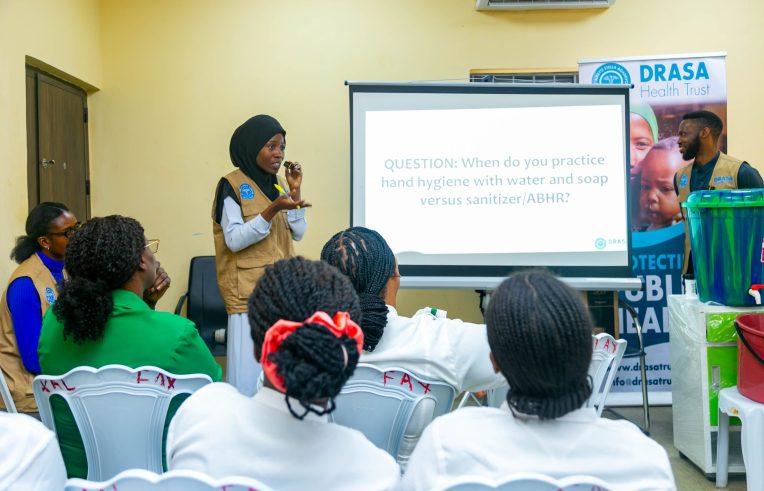"As a member of the cleaning staff at this Primary Health Center, I have learned the importance of wearing a nose mask while cleaning and washing my hands or using hand sanitizer if water is not available after cleaning. I will ensure to apply what I have learned today when carrying out my duties.”
Cleaning Staff, Ibeju Primary Health Center
Primary Healthcare Centers (PHCs) are the backbone of our communities, offering essential services to those who might not have the means to access private healthcare. For many, these centers are the first stop for medical care, making it crucial that they uphold the highest standards of hygiene and safety. Unfortunately, the reality often falls short. The World Health Organization (WHO) reports that 15 of every 100 patients acquires at least 1 infection while receiving care.
Recognizing the critical role that PHCs play in our healthcare system, we embarked on a mission to improve IPC practices at the grassroots level. Our journey began in the Ibeju-Lekki Local Government Area of Lagos State, where we launched the Primary Healthcare Center Hand Hygiene (PHC-HH) training sessions in Boije PHC, Ibeju PHC, and Awoyaya 1 PHC. Our goal was simple yet powerful: to empower health workers with the knowledge and skills they need to protect themselves and their patients from Healthcare-Associated Infections (HAIs).
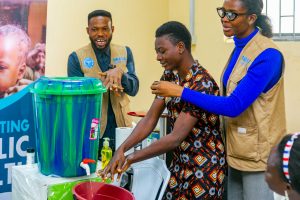
Establishing Contact
Before the training program commenced, we held an introductory meeting with some of the officials overseeing the health centers at the state primary healthcare board. Our goal was to gain insight into the unique challenges of each PHC and use data to identify those with the most need for IPC training. With their approval, we began by visiting selected PHC facilities in Ibeju Lekki Local Government Areas and met with their various leadership teams to assess and understand their current IPC needs, using the WHO Hand Hygiene Self-Assessment Framework and its IPC minimum requirements tool. The feedback from this assessment enabled us to tailor our training to address specific gaps in each facility.
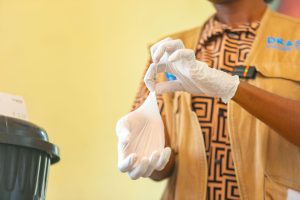
Taking Action
After gaining the consent of all parties, we started the work of training staff at the PHCs. We engaged and trained all health workers (doctors, nurses, medical laboratory technicians, pharmacists, public health officers, midwives, security personnel, medical record officers, cleaners, and community health extension workers). Using an instructor-led yet participatory learning approach, our training sessions covered all areas identified in our need assessments, such as germ transmission, hand hygiene, the appropriate handling and disposal of Personal Protective Equipment (PPEs), waste segregation, and management of various degrees of hospital waste, and effective cleaning strategies for performing environmental sanitation in the healthcare facility.
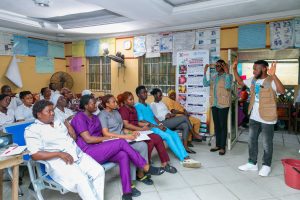
The sessions were interactive, with participants actively participating in practical demonstrations, such as donning gloves and performing the standard steps of handwashing. This hands-on approach not only reinforced the theoretical knowledge but also boosted the participants' confidence in applying these practices in their daily routines.
At the end of the training at the three facilities we visited, the health workers across these facilities had a better understanding of hand hygiene and other components of IPC and the role these play in reducing HAIs. These were attested to by an average 50% knowledge increase among all who were trained. Some health workers expressed their eagerness to apply some of the lessons learned in their day-to-day activities. “I learned about the five moments of hand hygiene. Although I was familiar with washing my hands after ward rounds, I didn't realize there were five specific moments of hand hygiene. I also learned about the correct hand washing steps, which I didn't know before,” said a nurse from Awoyaya 1 Primary Health Center.
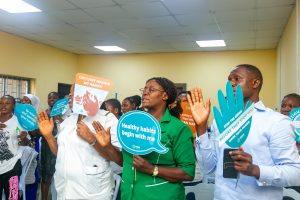
Adding a Dash of Fun
As an organization committed to education and training as a means of preventing diseases, we believe that learning should be fun and memorable. To keep the momentum going, we organized a Hand Hygiene Cafe session, which was a creative way to help reinforce the lessons that the health workers learned from the training sessions. Participants answered quiz questions for a chance to win prizes, posed with props that held key campaign messages to express their commitment to hand hygiene and safer care and took pledges to promote hand hygiene practices among themselves and with their patients.
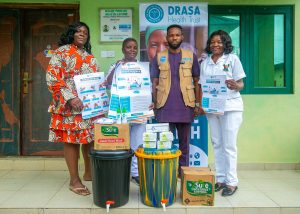
This is not goodbye.
As we wrapped up our training sessions in Ibeju-Lekki, we couldn't help but feel a sense of accomplishment. Over 65 workers across three PHCs—Bogije, Awoyaya 1, and Ibeju—had been trained in the essentials of IPC. To ensure the sustainability of this project and to see that these IPC practices continue, we identified and documented gaps in each of the facilities and are working to highlight corresponding actions taken or being taken to ensure that their unique IPC needs are addressed. We also provided each PHC with IPC supplies and hand hygiene promotion materials to be displayed at strategic points within the facilities as reminders to periodically perform hand hygiene.
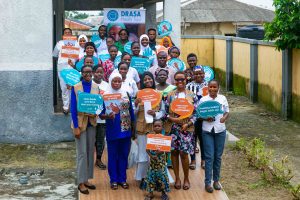
Looking ahead
An end is only a new beginning, and we are glad to have left our footprints at Ibeju PHC, Bogije PHC, and Awoyaya 1 PHC of the Ibeju-Lekki local government.
With our boots strapped on, we're ready to take our PHC-HH training sessions to other local government areas, where we continue to build a network of Health Champions committed to safeguarding their communities from HAIs.
Catch the highlights of our PHC-HH training here.

